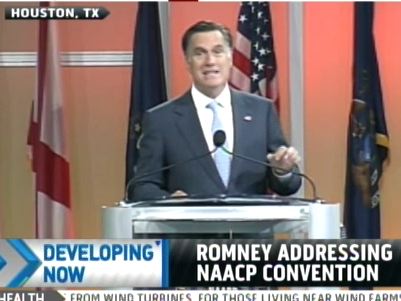Republican presidential contender Mitt Romney told the NAACP annual conference this morning: “I’ve never heard anyone look around an impoverished neighborhood and say, ‘You know, there’s too much free enterprise around here. Too many shops, too many jobs, too many people putting money in the bank.'” He’s wrong there–former Washington, DC mayor Marion Barry said that earlier this year–but Romney hit the right notes in pitching black voters on a common commitment to free enterprise, reaching past the big-government politics of the bulk of the NAACP’s leadership to connect directly with the aspirations of millions of Americans, black and white.
By offering his audience a clear contrast between his policies and those of Barack Obama on an issue that has nothing to do with race, Romney transcended the divisive rhetoric that has surrounded the conference. He did not take the bait offered by Attorney General Eric Holder yesterday, who told the NAACP that Republicans were effectively applying racist “poll taxes” to black Americans through voter ID laws, and seeking to reverse the gains of the civil rights movement. Instead, Romney pointed to the involvement of his father, former Michigan governor George Romney, in supporting protests and legislation during the civil rights struggle. And he ignored the boos that some attendees gave him when he promised to repeal Obamacare.
Romney acknowledged the misgivings some black voters have about Republicans, and asked them to look past stereotypes: “I believe that if you understood who I truly am in my heart, and if it were possible to fully communicate what I believe is in the real, enduring best interest of African American families, you would vote for me for president.” But for the most part, Romney addressed the attendees as Americans, not just as black Americans. He also outlined a 5-point economic plan–as opposed to the 59-point plan he unveiled several months ago–as the answer to unemployment in the black community and beyond:
My jobs plan is based on 25 years of success in business. It has five key steps.
First, I will take full advantage of our energy resources, and I will approve the Keystone pipeline from Canada. Low cost, plentiful coal, natural gas, oil, and renewables will bring over a million manufacturing jobs back to the United States.
Second, I will open up new markets for American products. We are the most productive major economy in the world, so trade means good jobs for Americans. But trade must be free and fair, so I’ll clamp down on cheaters like China and make sure that they finally play by the rules.
Third, I will reduce government spending. Our high level of debt slows GDP growth and that means fewer jobs. If our goal is jobs, we must, must stop spending over a trillion dollars more than we earn. To do this, I will eliminate expensive non-essential programs like Obamacare, and I will work to reform and save Medicare and Social Security, in part by means-testing their benefits.
Fourth, I will focus on nurturing and developing the skilled workers our economy so desperately needs and the future demands. This is the human capital with which tomorrow’s bright future will be built. Too many homes and too many schools are failing to provide our children with the skills and education that are essential for anything other than a minimum-wage job.
And finally and perhaps most importantly, I will restore economic freedom. This nation’s economy runs on freedom, on opportunity, on entrepreneurs, on dreamers who innovate and build businesses. These entrepreneurs are being crushed by high taxation, burdensome regulation, hostile regulators, excessive healthcare costs, and destructive labor policies. I will work to make America the best place in the world for innovators and entrepreneurs and businesses small and large.
Together with his emphasis on school choice, Romney’s speech was compelling–not just as an effort to reach out to black voters, but as a relevant and timely presentation of who he is and what he believes.
Meanwhile, President Obama skipped the conference, sending Vice President Joe Biden, whose racist rhetoric about Obama was once a source of embarrassment. It was an apt metaphor for the way in which Obama has betrayed the hope and trust of black voters–and Mitt Romney took full advantage today.

COMMENTS
Please let us know if you're having issues with commenting.